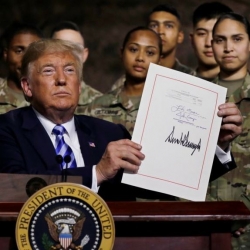
Between 2011 and 2015, overseas slot machines generated $538.9 million in revenue through the Defense Department.
The $717 billion National Defense Authorization Act signed into law on Tuesday by President Donald Trump includes mandatory screening of military personnel for problem gambling. The provision has been discussed by federal legislators since 2002, but only appeared in a signed bill this year.
The National Defense Authorization Act’s problem gambling provision (Section 733) responds to concerns that compulsive real money gaming is a rising issue among America’s Armed Services personnel.
In 2017, the Government Accountability Office (GAO) launched a study to determine the level of problem gambling to collect data on the issue after anecdotal evidence showed a possible increase in gambling addiction among US personnel.
Section 733 of H.R. 5515 stated, “The Secretary of Defense shall incorporate medical screening questions specific to gambling disorder into the Annual Periodic Health Assessments of members of the Armed Forces conducted by the Department of Defense during the one-year period beginning 180 days after the date of the enactment of this Act.”
Problem Gambling Screenings: February 2019
That means mandatory screenings for problem gambling will begin on February 10, 2019. The data collected could put to rest longstanding questions about the occurrence of such activity.
From 1993 to 2002, the defense budgets had screenings for what then was called gambling addiction. In the 2003 bill, screenings were dropped from the program. 2003 was the height of the War on Terror, when the United States invaded Saddam Hussein’s Iraq. The US also had what was then a 2-year commitment to fighting terrorism in Afghanistan. Under the circumstances, it was determined that army officers had more pressing matters than problem gambling tests.
Fifteen years later, the issue is still controversial among US military brass. In its 2017 GAO report, the Department of Defense argued that it was “impractical to screen for every low prevalence disorder“, so the report recommended no resources should go to tracking problem gambling among service people.
Despite rejecting the need for such measures, the Pentagon is careful to state it maintains a close eye on its personnel’s potential troubling behavior. The Defense Department stated in February 2017, “The decision on whether to screen for a disorder is carefully scrutinized with the DoD, with the priority given to high risk, high volume, and problem-prone disorders with validated measures for assessment.”
GAO: No Evidence of High-Prevalence
At the time, the GOA report said there was “no evidence” that problem gambling was a high-prevalence disorder among the military. No explanation was given to explain the reversal a year later, except the Government Accountability Office said Sen. Elizabeth Warren (D-Massachusetts) had asked the GOA to look into the matter. Senator Warren is a member of the political minority in the US Senate, though, so she does not have the power to order such research.
One might think the Defense Department is willing to comply with Sen. Warren’s in an election year, but problem gambling will be a non-issue in the 2018 midterm elections, so that is not an explanation. Besides, seven other election years have passed since the original problem gambling laws lapsed.
Why Problem Gambling Is an Issue
Some Pentagon officials might see the problem gambling issue as a human resources, discipline, and security perspective. Problem gambling might lead to financial stresses, debt, and bankruptcy for soldiers, sailors, airmen, and marines. Such concerns could lead to poor morale, divorces, and lingering psychological issues.
It also could lead to compromised service members. If personnel handle sensitive information or key postings, they might be vulnerable to foreign influence or active measures. A person offers a loan or forgiveness of gambling debts. Later, that same person could threaten to expose the service member’s gambling habits or the fact they took money from a foreigner. Rival governments have been known to make inroads with US-government employees for most of the past century.
A public statement by the White House on H.R. 5515 said it was, “An Act to authorize appropriations for fiscal year 2019 for military activities of the Department of Defense, for military construction, and for defense activities of the Department of Energy, to prescribe military personnel strengths for such fiscal year, and for other purposes.”
Pentagon to Collect Problem Gambling Data
Of course, leaders who passed the legislation might be concerned about the well-being of service members and their family. In a cynical age, it is easy to overlook the obvious – that officials might be concerned about the effects of problem gambling on lives.
Knowledge of the problem is half the battle. Having a mandatory screening process should help Pentagon officials learn whether there is a problem or not. For years, a debate has raged, but both sides have argued without facts on hand. With data to support their arguments from the 2019 National Defense Authorization Act, a better set of policies might emerge.
Whatever one thinks of the issue, Americans should know in a year or two if problem gambling is “a high-prevalence disorder” or is a marginal concern for soldiers and their overseers.
